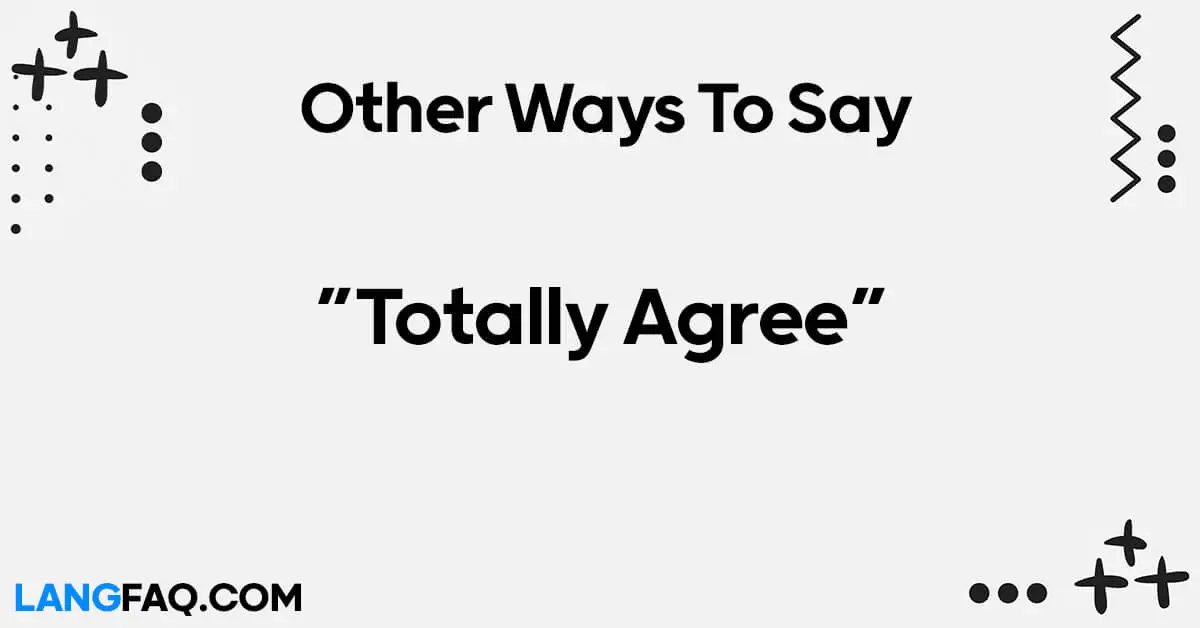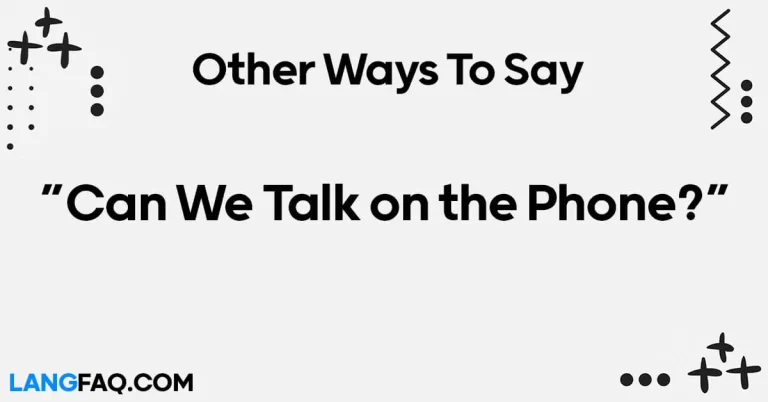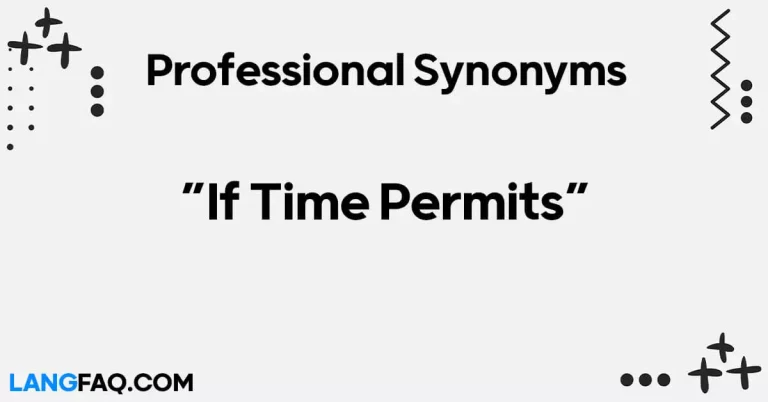Agreement is the cornerstone of effective communication, whether in casual conversations or formal discussions. However, using the same phrase repeatedly can make your dialogue sound monotonous. In this article, we’ll delve into 12 alternative expressions for “totally agree” that can add flair and variety to your conversations. From everyday colloquialisms to more formal language, you’ll discover a range of options to suit any context.
12 Other Ways to Say “Totally Agree”
Here are 12 other ways to say “totally agree”:
- Completely concur
- Wholeheartedly support
- Absolutely endorse
- Fully back
- Entirely agree
- Firmly believe
- Wholeheartedly agree
- Utterly support
- Absolutely concur
- Completely endorse
- Fully support
- Entirely endorse
| Phrase | Meaning | Example |
|---|---|---|
| Completely concur | To fully agree without reservation | “I completely concur with your assessment.” |
| Wholeheartedly support | To give unwavering support | “I wholeheartedly support your decision.” |
| Absolutely endorse | To unequivocally approve | “I absolutely endorse this proposal.” |
| Fully back | To support completely | “I fully back your plan.” |
| Entirely agree | To agree entirely | “I entirely agree with your analysis.” |
| Firmly believe | To have strong conviction | “I firmly believe in your capabilities.” |
| Wholeheartedly agree | To agree with full sincerity | “I wholeheartedly agree with your statement.” |
| Utterly support | To support without reservation | “I utterly support your initiative.” |
| Absolutely concur | To fully agree without hesitation | “I absolutely concur with your opinion.” |
| Completely endorse | To fully approve without reservation | “I completely endorse your decision.” |
| Fully support | To offer complete support | “I fully support your efforts.” |
| Entirely endorse | To give complete approval | “I entirely endorse your proposal.” |
This table showcases 12 alternative ways to express complete agreement. From emphasizing full support to unwavering endorsement, these phrases offer versatility and nuance in conveying agreement in various contexts. Incorporating these expressions into your communication can enrich dialogue and foster better understanding and rapport with others.
Is It Correct to Say “Totally Agree”?
Yes, it is correct to say “Totally Agree.”
The phrase “Totally Agree” is commonly used to express complete alignment or consensus with a statement, opinion, or course of action. “Totally” emphasizes the extent or degree of agreement, indicating that there are no reservations or doubts regarding the agreement.
For example, if someone suggests going to a specific restaurant for dinner and you agree wholeheartedly, you might respond by saying, “I totally agree! That sounds like a great choice.”
In both formal and informal contexts, “Totally Agree” effectively communicates full agreement and alignment with the topic or statement being discussed.
Professional Mail Example With “Totally Agree”
Subject: Full Agreement with Proposed Strategy
Dear [Recipient’s Name],
I hope this email finds you well. I wanted to take a moment to express my thoughts on the strategy proposal discussed during our recent meeting.
After careful consideration and analysis, I wanted to convey that I totally agree with the proposed strategy. It aligns seamlessly with our organizational objectives and presents a comprehensive approach to addressing the current challenges we face.
I believe that implementing this strategy will not only streamline our operations but also position us for long-term success in the market. The thoroughness and foresight demonstrated in the proposal are commendable, and I am fully supportive of moving forward with its execution.
If there are any additional insights or contributions I can offer to support the implementation process, please do not hesitate to reach out. I am eager to collaborate further and contribute to the success of this endeavor.
Thank you for considering my input, and I look forward to seeing the positive impact of this strategy unfold in the coming months.
Best regards, [Your Name]
Completely Concur: Expressing Full Agreement
When it comes to expressing complete agreement, “completely concur” is a phrase that adds a touch of formality and certainty to your affirmation. This expression is ideal for situations where you want to convey unwavering support for an idea or opinion.
Formal Context: In professional settings, using “completely concur” can help assert your agreement with a colleague’s proposal or decision. For example, during a team meeting, you might say, “I completely concur with Sarah’s analysis of the market trends. It aligns perfectly with our strategic objectives.”
Informal Context: In casual conversations among friends, “completely concur” can still be used to emphasize agreement in a more relaxed manner. For instance, when discussing weekend plans, you could say, “I completely concur! A beach day sounds like the perfect way to unwind.”
Variations:
- Colleague to Colleague: “I completely concur with your assessment.”
- Friend to Friend: “I’m with you 100% on that!”
- Mentor to Mentee: “I completely concur with your approach, but have you considered this alternative perspective?”
Example Sentence: “I completely concur with your proposal to streamline our workflow processes for greater efficiency.”
Email Sample:
Subject: Agreement on Proposed Changes
Hi [Colleague’s Name],
I wanted to let you know that after reviewing your proposal, I completely concur with the suggested changes. Your insights into streamlining our workflow processes are spot on, and I believe implementing them will significantly enhance our productivity.
Best regards, [Your Name]
Dictionary Insight: According to Cambridge Dictionary, “concur” means to agree with someone or have the same opinion as them.
When to Use: Use “completely concur” when you want to emphasize full agreement with a statement or proposal.
Pros:
- Conveys certainty and conviction
- Suitable for formal and informal contexts
- Adds variety to language use
Cons:
- May sound overly formal in casual conversations
- Requires careful consideration of context to avoid appearing insincere or pretentious
Related Grammar/Usage Rules:
- Use “completely concur” followed by “with” and the statement or proposal you are agreeing with.
- Ensure agreement between subjects and verbs in the sentence (e.g., “I completely concur” vs. “She completely concurs”).
Exceptions:
- “Completely concur” may be less suitable in situations where a more casual tone is desired, such as informal gatherings or social settings.
Definitions:
- “Completely”: To the fullest extent or degree; totally.
- “Concur”: To agree with someone or have the same opinion as them.
Tips:
- Use “completely concur” sparingly in casual conversations to avoid sounding overly formal.
- Consider the tone and formality of the situation before using this phrase to ensure it fits appropriately.
Wholeheartedly Support: Offering Unwavering Endorsement
Expressing “wholeheartedly support” signifies offering complete and enthusiastic endorsement of an idea, proposal, or viewpoint. This phrase conveys not only agreement but also a sense of dedication and commitment to the supported cause.
Formal Context: In professional environments, demonstrating “wholeheartedly support” can be instrumental in rallying team members behind a common goal. For instance, in a board meeting discussing a new marketing strategy, you might declare, “I wholeheartedly support this initiative and believe it aligns perfectly with our company’s objectives.”
Informal Context: In personal relationships or casual settings, “wholeheartedly support” can convey genuine enthusiasm and encouragement. For example, when a friend shares their aspirations, you could respond, “I wholeheartedly support you pursuing your passion. You’ve got what it takes to succeed!”
Variations:
- Colleague to Colleague: “I wholeheartedly support your decision.”
- Friend to Friend: “Count me in! I wholeheartedly support your plan.”
- Mentor to Mentee: “As your mentor, I wholeheartedly support your growth and development.”
Example Sentence: “I wholeheartedly support the proposal to increase funding for the community outreach program. It’s a worthy cause that deserves our full backing.”
Email Sample:
Subject: Full Endorsement of Project Proposal
Hi [Team Member’s Name],
I wanted to reach out to express my full support for the project proposal you presented during yesterday’s meeting. I wholeheartedly support the direction you’ve outlined and am eager to contribute to its success in any way I can.
Warm regards, [Your Name]
Dictionary Insight: According to the Merriam-Webster dictionary, “wholehearted” means marked by complete earnest commitment, free from all reserve or hesitation.
When to Use: Use “wholeheartedly support” when you want to convey enthusiastic endorsement and unwavering commitment to an idea or proposal.
Pros:
- Conveys genuine enthusiasm and commitment
- Suitable for both formal and informal contexts
- Demonstrates solidarity and unity in teamwork or relationships
Cons:
- May come across as insincere if not genuinely meant
- Requires careful consideration of context to ensure appropriateness
Related Grammar/Usage Rules:
- Use “wholeheartedly support” followed by the subject or proposal being endorsed.
- Ensure agreement between subjects and verbs in the sentence (e.g., “I wholeheartedly support” vs. “He wholeheartedly supports”).
Exceptions:
- “Wholeheartedly support” may not be suitable in situations where neutrality or reservations are necessary.
Definitions:
- “Wholeheartedly”: With complete sincerity and commitment; enthusiastically.
- “Support”: To approve of, back, or uphold; to give assistance or encouragement to.
Tips:
- Be genuine when expressing “wholeheartedly support” to avoid appearing disingenuous.
- Consider the impact of your endorsement on the recipient and the situation before declaring full support.
Absolutely Endorse: Offering Unconditional Approval
When you “absolutely endorse” something, you are offering unequivocal approval and support for a particular idea, decision, or action. This phrase conveys a strong sense of conviction and confidence in the endorsed concept.
Formal Context: In professional settings, demonstrating “absolute endorsement” can be crucial in solidifying decisions and garnering consensus among colleagues. For instance, in a boardroom discussion on a new product launch, you might assert, “I absolutely endorse this strategy. It aligns perfectly with our market research findings and long-term goals.”
Informal Context: In personal relationships or informal discussions, “absolute endorsement” can convey sincere enthusiasm and confidence in someone’s choices or endeavors. For example, when a friend shares their career aspirations, you could respond, “I absolutely endorse your decision to pursue your passion. You have the talent and drive to succeed!”
Variations:
- Colleague to Colleague: “I absolutely endorse your proposal.”
- Friend to Friend: “I’m fully behind you! I absolutely endorse your plan.”
- Mentor to Mentee: “As your mentor, I absolutely endorse your decision. I believe it aligns perfectly with your strengths and goals.”
Example Sentence: “I absolutely endorse the recommendation to expand our customer service team. It’s a strategic move that will enhance our customer satisfaction levels and drive growth.”
Email Sample:
Subject: Full Endorsement of Proposal
Hi [Recipient’s Name],
I wanted to reach out to express my full endorsement of the proposal you presented during our last meeting. I absolutely endorse the direction you’ve outlined and am confident it will lead to positive outcomes for our team.
Best regards, [Your Name]
Dictionary Insight: According to Oxford Languages, “endorse” means to declare one’s public approval or support of.
When to Use: Use “absolutely endorse” when you want to convey unwavering approval and confidence in a decision or proposal.
Pros:
- Conveys strong conviction and confidence
- Suitable for formal and informal contexts
- Reinforces trust and credibility in your support
Cons:
- May sound overly emphatic if not genuinely meant
- Requires careful consideration of context to ensure appropriateness
Related Grammar/Usage Rules:
- Use “absolutely endorse” followed by the subject or proposal being endorsed.
- Ensure agreement between subjects and verbs in the sentence (e.g., “I absolutely endorse” vs. “She absolutely endorses”).
Exceptions:
- “Absolutely endorse” may not be suitable in situations where neutrality or reservations are necessary.
Definitions:
- “Absolutely”: Completely; totally; without any qualification or restriction.
- “Endorse”: To declare one’s public approval or support of; to express confidence in or approval of (a person or their actions).
Tips:
- Be genuine when expressing “absolute endorsement” to avoid appearing insincere.
- Consider the impact of your endorsement on the recipient and the situation before declaring full support.
Fully Back: Providing Complete Support
When you “fully back” someone or something, you are offering complete support and endorsement for their actions, decisions, or ideas. This phrase conveys a strong sense of commitment and solidarity with the person or cause being supported.
Formal Context: In professional environments, demonstrating “full backing” can be instrumental in fostering confidence and unity within teams. For example, in a project meeting, you might declare, “I fully back this proposal. It’s well-researched and aligns perfectly with our project objectives.”
Informal Context: In personal relationships or casual discussions, “fully backing” can convey genuine encouragement and loyalty. For instance, when a friend shares their aspirations to start a business, you could respond, “I fully back your decision. You’ve got the skills and determination to succeed!”
Variations:
- Colleague to Colleague: “I fully back your initiative.”
- Friend to Friend: “You can count on me! I fully back your plan.”
- Mentor to Mentee: “As your mentor, I fully back your decision. I believe it’s the right choice for your growth and development.”
Example Sentence: “I fully back the proposal to implement flexible work hours. It’s a progressive approach that will boost employee morale and productivity.”
Email Sample:
Subject: Full Support for Proposal
Hi [Recipient’s Name],
I wanted to express my full backing for the proposal you presented during our meeting. I believe it’s a well-thought-out plan that deserves our collective support. I fully back your efforts to move this initiative forward.
Best regards, [Your Name]
Dictionary Insight: According to Merriam-Webster, “back” means to give support to; to endorse or approve.
When to Use: Use “fully back” when you want to convey complete support and endorsement for a person, idea, or action.
Pros:
- Conveys unwavering commitment and solidarity
- Suitable for both formal and informal contexts
- Reinforces trust and confidence in your support
Cons:
- May sound overly emphatic if not genuinely meant
- Requires careful consideration of context to ensure appropriateness
Related Grammar/Usage Rules:
- Use “fully back” followed by the subject or proposal being supported.
- Ensure agreement between subjects and verbs in the sentence (e.g., “I fully back” vs. “She fully backs”).
Exceptions:
- “Fully back” may not be suitable in situations where neutrality or reservations are necessary.
Definitions:
- “Fully”: To the fullest extent or degree; completely.
- “Back”: To give support to; to endorse or approve.
Tips:
- Be sincere when expressing “full backing” to avoid appearing insincere.
- Consider the impact of your backing on the recipient and the situation before declaring full support.
Entirely Agree: Affirming Complete Consensus
When you “entirely agree,” you are affirming complete alignment with a statement, opinion, or course of action. This phrase conveys a sense of unity and harmony in your agreement, leaving no room for doubt or dissent.
Formal Context: In professional settings, expressing “entirely agree” can help reinforce consensus and cohesion within teams. For example, during a strategy meeting, you might assert, “I entirely agree with this approach. It’s data-driven and aligns perfectly with our company objectives.”
Informal Context: In personal interactions or casual discussions, “entirely agree” can convey genuine camaraderie and rapport. For instance, when discussing vacation plans with friends, you could say, “I entirely agree! A beach getaway sounds like the perfect escape.”
Variations:
- Colleague to Colleague: “I entirely agree with your analysis.”
- Friend to Friend: “I’m on the same page! I entirely agree with your suggestion.”
- Mentor to Mentee: “As your mentor, I entirely agree with your decision. It demonstrates sound judgment and foresight.”
Example Sentence: “I entirely agree with the proposal to prioritize customer satisfaction. It’s essential for maintaining our competitive edge in the market.”
Email Sample:
Subject: Full Agreement on Strategy
Hi [Recipient’s Name],
I wanted to reach out to express my full agreement with the strategy outlined in our recent meeting. I entirely agree with the proposed approach and believe it’s the right path forward for our team.
Best regards, [Your Name]
Dictionary Insight: According to Cambridge Dictionary, “entirely” means completely or wholly, without reservation or exception.
When to Use: Use “entirely agree” when you want to convey complete alignment and unity of opinion with a statement or proposal.
Pros:
- Conveys unity and consensus
- Suitable for both formal and informal contexts
- Reinforces harmony and rapport in relationships
Cons:
- May sound overly emphatic if not genuinely meant
- Requires careful consideration of context to ensure appropriateness
Related Grammar/Usage Rules:
- Use “entirely agree” followed by the statement or proposal being agreed with.
- Ensure agreement between subjects and verbs in the sentence (e.g., “I entirely agree” vs. “She entirely agrees”).
Exceptions:
- “Entirely agree” may not be suitable in situations where neutrality or reservations are necessary.
Definitions:
- “Entirely”: Completely or wholly, without reservation or exception.
- “Agree”: To have the same opinion or be in harmony with someone or something.
Tips:
- Be genuine when expressing “entirely agree” to avoid appearing disingenuous.
- Consider the context and tone of the situation before declaring full agreement.
Firmly Believe: Expressing Strong Conviction
When you “firmly believe” in something, you are expressing a deep-seated conviction and confidence in its truth or validity. This phrase conveys steadfastness and certainty in your beliefs, making it a powerful statement of affirmation.
Formal Context: In professional environments, expressing a “firm belief” can demonstrate leadership and decisiveness. For example, during a business presentation, you might assert, “I firmly believe that our new marketing strategy will drive significant growth.”
Informal Context: In personal interactions or casual discussions, “firmly believe” can convey sincerity and conviction. For instance, when discussing personal values with a friend, you could say, “I firmly believe in honesty and integrity as the foundation of strong relationships.”
Variations:
- Colleague to Colleague: “I firmly believe in your abilities.”
- Friend to Friend: “I stand by you! I firmly believe in your dreams.”
- Mentor to Mentee: “As your mentor, I firmly believe in your potential. You have what it takes to succeed.”
Example Sentence: “I firmly believe that investing in employee training and development is key to our company’s long-term success.”
Email Sample:
Subject: Strong Belief in Project Success
Hi [Recipient’s Name],
I wanted to share my strong belief in the success of the project we’re undertaking. I firmly believe in the team’s capabilities and the strategic direction we’ve set. Let’s continue to work together towards our shared goals.
Best regards, [Your Name]
Dictionary Insight: According to Merriam-Webster, “firmly” means in a resolute or unwavering manner.
When to Use: Use “firmly believe” when you want to convey strong conviction and confidence in a belief, idea, or course of action.
Pros:
- Conveys strength and conviction
- Suitable for both formal and informal contexts
- Reinforces confidence and leadership qualities
Cons:
- May sound overly assertive if not genuinely meant
- Requires careful consideration of context to ensure appropriateness
Related Grammar/Usage Rules:
- Use “firmly believe” followed by the belief or idea being affirmed.
- Ensure agreement between subjects and verbs in the sentence (e.g., “I firmly believe” vs. “She firmly believes”).
Exceptions:
- “Firmly believe” may not be suitable in situations where neutrality or open-mindedness are necessary.
Definitions:
- “Firmly”: In a resolute or unwavering manner.
- “Believe”: To have confidence in the truth, existence, reliability, or value of something.
Tips:
- Be sincere when expressing a “firm belief” to avoid appearing insincere or dogmatic.
- Consider the impact of your belief on the recipient and the situation before declaring it firmly.
Wholeheartedly Agree: Expressing Genuine Alignment
When you “wholeheartedly agree” with someone or something, you are expressing complete sincerity and alignment with a statement, idea, or course of action. This phrase conveys a sense of genuine enthusiasm and commitment to the agreement.
Formal Context: In professional settings, demonstrating a “wholehearted agreement” can foster trust and collaboration among colleagues. For example, during a project review meeting, you might assert, “I wholeheartedly agree with the proposed timeline. It’s ambitious yet achievable.”
Informal Context: In personal relationships or casual conversations, “wholeheartedly agree” can convey warmth and camaraderie. For instance, when discussing weekend plans with friends, you could say, “I’m all in! I wholeheartedly agree with a movie night.”
Variations:
- Colleague to Colleague: “I wholeheartedly agree with your assessment.”
- Friend to Friend: “I’m with you all the way! I wholeheartedly agree with your decision.”
- Mentor to Mentee: “As your mentor, I wholeheartedly agree with your approach. It shows maturity and foresight.”
Example Sentence: “I wholeheartedly agree with the proposal to allocate additional resources to customer service. It’s crucial for maintaining customer satisfaction levels.”
Email Sample:
Subject: Full Agreement on Project Direction
Hi [Recipient’s Name],
I wanted to express my full agreement with the direction our project is taking. I wholeheartedly agree with the strategies outlined and am committed to our shared success.
Best regards, [Your Name]
Dictionary Insight: According to Oxford Languages, “wholeheartedly” means with complete sincerity and commitment.
When to Use: Use “wholeheartedly agree” when you want to convey genuine enthusiasm and commitment to an agreement.
Pros:
- Conveys sincerity and commitment
- Suitable for both formal and informal contexts
- Builds rapport and trust in relationships
Cons:
- May sound overly enthusiastic if not genuinely meant
- Requires careful consideration of context to ensure appropriateness
Related Grammar/Usage Rules:
- Use “wholeheartedly agree” followed by the statement or proposal being agreed with.
- Ensure agreement between subjects and verbs in the sentence (e.g., “I wholeheartedly agree” vs. “She wholeheartedly agrees”).
Exceptions:
- “Wholeheartedly agree” may not be suitable in situations where neutrality or reservations are necessary.
Definitions:
- “Wholeheartedly”: With complete sincerity and commitment.
- “Agree”: To have the same opinion or be in harmony with someone or something.
Tips:
- Be genuine when expressing “wholehearted agreement” to avoid appearing insincere.
- Consider the context and tone of the situation before declaring full agreement.
Utterly Support: Offering Unconditional Assistance
When you “utterly support” someone or something, you are expressing complete and unconditional assistance or endorsement. This phrase conveys a strong sense of commitment and dedication to the supported cause.
Formal Context: In professional environments, demonstrating “utter support” can be crucial in fostering teamwork and achieving common goals. For example, during a project presentation, you might assert, “I utterly support this initiative. It’s aligned with our company’s mission and vision.”
Informal Context: In personal relationships or casual discussions, “utter support” can convey genuine encouragement and solidarity. For instance, when a friend shares their career aspirations, you could say, “You can count on me! I utterly support your decision to pursue your dreams.”
Variations:
- Colleague to Colleague: “I utterly support your proposal.”
- Friend to Friend: “I’ve got your back! I utterly support your plan.”
- Mentor to Mentee: “As your mentor, I utterly support your growth and development. I believe in your potential.”
Example Sentence: “I utterly support the idea of implementing a mentorship program. It’s a valuable investment in our team’s professional development.”
Email Sample:
Subject: Full Endorsement of Proposal
Hi [Recipient’s Name],
I wanted to reach out to express my full support for the proposal you presented during our meeting. I utterly support the direction you’ve outlined and am committed to its success.
Best regards, [Your Name]
Dictionary Insight: According to Merriam-Webster, “utter” means complete or total.
When to Use: Use “utterly support” when you want to convey complete and unconditional assistance or endorsement.
Pros:
- Conveys strong commitment and dedication
- Suitable for both formal and informal contexts
- Demonstrates unwavering solidarity and loyalty
Cons:
- May sound overly emphatic if not genuinely meant
- Requires careful consideration of context to ensure appropriateness
Related Grammar/Usage Rules:
- Use “utterly support” followed by the subject or proposal being supported.
- Ensure agreement between subjects and verbs in the sentence (e.g., “I utterly support” vs. “She utterly supports”).
Exceptions:
- “Utterly support” may not be suitable in situations where neutrality or reservations are necessary.
Definitions:
- “Utterly”: Completely or totally.
- “Support”: To approve of, back, or uphold; to give assistance or encouragement to.
Tips:
- Be genuine when expressing “utter support” to avoid appearing insincere.
- Consider the impact of your support on the recipient and the situation before declaring it utterly.
Absolutely Concur: Affirming Unquestionable Agreement
When you “absolutely concur,” you are expressing unequivocal agreement with a statement, decision, or course of action. This phrase conveys a strong sense of conviction and certainty in your agreement, leaving no room for doubt or ambiguity.
Formal Context: In professional environments, expressing “absolute concurrence” can reinforce consensus and unity within teams. For example, during a strategic planning session, you might assert, “I absolutely concur with the proposed budget allocation. It’s in line with our strategic objectives and financial constraints.”
Informal Context: In personal relationships or casual conversations, “absolutely concur” can convey genuine alignment and rapport. For instance, when discussing travel plans with a friend, you could say, “I’m on board! I absolutely concur with your choice of destination.”
Variations:
- Colleague to Colleague: “I absolutely concur with your assessment.”
- Friend to Friend: “I’m right there with you! I absolutely concur with your opinion.”
- Mentor to Mentee: “As your mentor, I absolutely concur with your decision. It demonstrates maturity and sound judgment.”
Example Sentence: “I absolutely concur with the recommendation to expand our product line. It’s a strategic move that aligns with market trends and consumer demand.”
Email Sample:
Subject: Full Agreement on Strategy
Hi [Recipient’s Name],
I wanted to express my full agreement with the strategy outlined in our recent meeting. I absolutely concur with the proposed approach and believe it’s the right path forward for our team.
Best regards, [Your Name]
Dictionary Insight: According to Oxford Languages, “concur” means to be of the same opinion; agree.
When to Use: Use “absolutely concur” when you want to convey unwavering agreement and certainty in your stance.
Pros:
- Conveys strong conviction and certainty
- Suitable for both formal and informal contexts
- Reinforces unity and consensus in discussions or decision-making
Cons:
- May sound overly assertive if not genuinely meant
- Requires careful consideration of context to ensure appropriateness
Related Grammar/Usage Rules:
- Use “absolutely concur” followed by the statement or proposal being agreed with.
- Ensure agreement between subjects and verbs in the sentence (e.g., “I absolutely concur” vs. “She absolutely concurs”).
Exceptions:
- “Absolutely concur” may not be suitable in situations where neutrality or dissenting opinions are necessary.
Definitions:
- “Absolutely”: Completely; totally; without any qualification or restriction.
- “Concur”: To be of the same opinion; agree.
Tips:
- Be sincere when expressing “absolute concurrence” to avoid appearing insincere or dismissive.
- Consider the context and tone of the situation before declaring full agreement.
Fully Support: Providing Unwavering Endorsement
When you “fully support” someone or something, you are offering unwavering endorsement and commitment. This phrase conveys a strong sense of solidarity and dedication to the supported cause.
Formal Context: In professional settings, demonstrating “full support” can be instrumental in fostering cooperation and achieving organizational goals. For example, during a board meeting, you might declare, “I fully support this proposal. It’s well-researched and aligns with our strategic objectives.”
Informal Context: In personal relationships or casual conversations, “full support” can convey genuine encouragement and loyalty. For instance, when discussing a friend’s career aspirations, you could say, “You have my full support. I believe in your abilities and vision.”
Variations:
- Colleague to Colleague: “I fully support your decision.”
- Friend to Friend: “Count me in! I fully support your plan.”
- Mentor to Mentee: “As your mentor, I fully support your growth and development. I’m here to help you succeed.”
Example Sentence: “I fully support the initiative to implement flexible work arrangements. It’s a progressive approach that promotes work-life balance and productivity.”
Email Sample:
Subject: Full Endorsement of Proposal
Hi [Recipient’s Name],
I wanted to express my full support for the proposal you presented during our meeting. I fully support the direction you’ve outlined and am committed to its success.
Best regards, [Your Name]
Dictionary Insight: According to Merriam-Webster, “support” means to promote the interests or cause of; to uphold or defend as valid or right.
When to Use: Use “fully support” when you want to convey complete endorsement and commitment to a person, idea, or action.
Pros:
- Conveys unwavering commitment and dedication
- Suitable for both formal and informal contexts
- Reinforces trust and confidence in your support
Cons:
- May sound overly emphatic if not genuinely meant
- Requires careful consideration of context to ensure appropriateness
Related Grammar/Usage Rules:
- Use “fully support” followed by the subject or proposal being supported.
- Ensure agreement between subjects and verbs in the sentence (e.g., “I fully support” vs. “She fully supports”).
Exceptions:
- “Fully support” may not be suitable in situations where neutrality or reservations are necessary.
Definitions:
- “Fully”: Completely; to the fullest extent.
- “Support”: To promote the interests or cause of; to uphold or defend as valid or right.
Tips:
- Be sincere when expressing “full support” to avoid appearing insincere.
- Consider the impact of your support on the recipient and the situation before declaring it fully.
Completely Agree: Affirming Total Consensus
When you “completely agree” with someone or something, you are affirming total alignment and harmony with a statement, decision, or viewpoint. This phrase conveys a sense of unity and solidarity in your agreement, leaving no room for doubt or disagreement.
Formal Context: In professional environments, expressing “complete agreement” can reinforce cooperation and mutual understanding. For example, during a team meeting, you might assert, “I completely agree with the proposed strategy. It’s well-thought-out and addresses our current challenges effectively.”
Informal Context: In personal relationships or casual conversations, “complete agreement” can convey genuine support and rapport. For instance, when discussing weekend plans with friends, you could say, “I’m on the same page! I completely agree with your idea for a hiking trip.”
Variations:
- Colleague to Colleague: “I completely agree with your analysis.”
- Friend to Friend: “I’m right there with you! I completely agree with your perspective.”
- Mentor to Mentee: “As your mentor, I completely agree with your approach. It shows maturity and insight.”
Example Sentence: “I completely agree with the decision to expand our product line. It’s a strategic move that will help us capture new market opportunities.”
Email Sample:
Subject: Full Agreement on Proposal
Hi [Recipient’s Name],
I wanted to express my full agreement with the proposal you presented during our meeting. I completely agree with the direction you’ve outlined and am committed to its success.
Best regards, [Your Name]
Dictionary Insight: According to Oxford Languages, “completely” means in every way or respect; fully.
When to Use: Use “completely agree” when you want to convey total alignment and consensus with a statement, decision, or viewpoint.
Pros:
- Conveys total alignment and unity
- Suitable for both formal and informal contexts
- Reinforces mutual understanding and cooperation
Cons:
- May sound overly emphatic if not genuinely meant
- Requires careful consideration of context to ensure appropriateness
Related Grammar/Usage Rules:
- Use “completely agree” followed by the statement or decision being agreed with.
- Ensure agreement between subjects and verbs in the sentence (e.g., “I completely agree” vs. “She completely agrees”).
Exceptions:
- “Completely agree” may not be suitable in situations where neutrality or dissenting opinions are necessary.
Definitions:
- “Completely”: In every way or respect; fully.
- “Agree”: To have the same opinion or be in harmony with someone or something.
Tips:
- Be sincere when expressing “complete agreement” to avoid appearing insincere or dismissive.
- Consider the context and tone of the situation before declaring total agreement.
Wholeheartedly Support: Providing Unwavering Backing
When you “wholeheartedly support” someone or something, you are offering unwavering endorsement and backing. This phrase conveys a deep sense of commitment and dedication to the cause or individual being supported.
Formal Context: In professional settings, demonstrating “wholehearted support” can be pivotal in fostering collaboration and achieving organizational objectives. For example, during a project review meeting, you might affirm, “I wholeheartedly support this initiative. It’s aligned with our company’s mission and strategic goals.”
Informal Context: In personal relationships or casual conversations, “wholehearted support” can convey genuine encouragement and solidarity. For instance, when discussing career aspirations with a friend, you could express, “You have my full support. I wholeheartedly believe in your abilities and aspirations.”
Variations:
- Colleague to Colleague: “I wholeheartedly support your decision.”
- Friend to Friend: “I’m behind you all the way! I wholeheartedly support your plan.”
- Mentor to Mentee: “As your mentor, I wholeheartedly support your growth and development. I’m here to assist you every step of the way.”
Example Sentence: “I wholeheartedly support the proposal to implement sustainable practices in our business operations. It’s a responsible approach that aligns with our values and long-term objectives.”
Email Sample:
Subject: Full Endorsement of Proposal
Hi [Recipient’s Name],
I wanted to convey my full support for the proposal you presented during our recent meeting. I wholeheartedly support the direction you’ve outlined and am committed to its success.
Best regards, [Your Name]
Dictionary Insight: According to Merriam-Webster, “wholeheartedly” means with complete sincerity and enthusiasm.
When to Use: Use “wholeheartedly support” when you want to convey unwavering commitment and dedication to a person, idea, or action.
Pros:
- Conveys sincere commitment and dedication
- Suitable for both formal and informal contexts
- Reinforces trust and confidence in your support
Cons:
- May sound overly emphatic if not genuinely meant
- Requires careful consideration of context to ensure appropriateness
Related Grammar/Usage Rules:
- Use “wholeheartedly support” followed by the subject or proposal being supported.
- Ensure agreement between subjects and verbs in the sentence (e.g., “I wholeheartedly support” vs. “She wholeheartedly supports”).
Exceptions:
- “Wholeheartedly support” may not be suitable in situations where neutrality or reservations are necessary.
Definitions:
- “Wholeheartedly”: With complete sincerity and enthusiasm.
- “Support”: To promote the interests or cause of; to uphold or defend as valid or right.
Tips:
- Be genuine when expressing “wholehearted support” to avoid appearing insincere.
- Consider the impact of your support on the recipient and the situation before declaring it wholeheartedly.
FAQs
What are some informal ways to say “totally agree”? Informal alternatives to “totally agree” include phrases like “absolutely,” “definitely,” “for sure,” “you bet,” “count me in,” and “no doubt.”
Are there any formal alternatives to “totally agree”? Formal alternatives to “totally agree” include phrases like “wholeheartedly endorse,” “completely support,” “firmly agree,” “fully endorse,” and “heartily support.”
How can I express strong agreement in a professional setting? In a professional setting, you can express strong agreement by using phrases like “wholeheartedly endorse,” “firmly agree,” “completely support,” and “fully endorse” to convey conviction and professionalism.
What are some synonyms for “totally agree” in casual conversations? Synonyms for “totally agree” in casual conversations include phrases like “absolutely,” “definitely,” “for sure,” “you bet,” “count me in,” and “no doubt.”
Can I use these alternatives interchangeably with “totally agree”? Yes, you can use these alternatives interchangeably with “totally agree” to add variety and emphasis to your statements while maintaining the same meaning.
Is it essential to vary my language when expressing agreement? Varying your language when expressing agreement can enhance communication and make your dialogue more engaging and dynamic. It also allows you to tailor your response to suit the context and tone of the conversation.
Conclusion
In conclusion, having a diverse vocabulary of expressions for agreement can enrich your communication skills and make your conversations more lively and engaging. Whether you’re expressing agreement in casual conversations or professional settings, these alternatives to “totally agree” offer versatility and nuance. By incorporating these phrases into your dialogue, you can convey agreement with confidence and flair, fostering better understanding and rapport with others.







